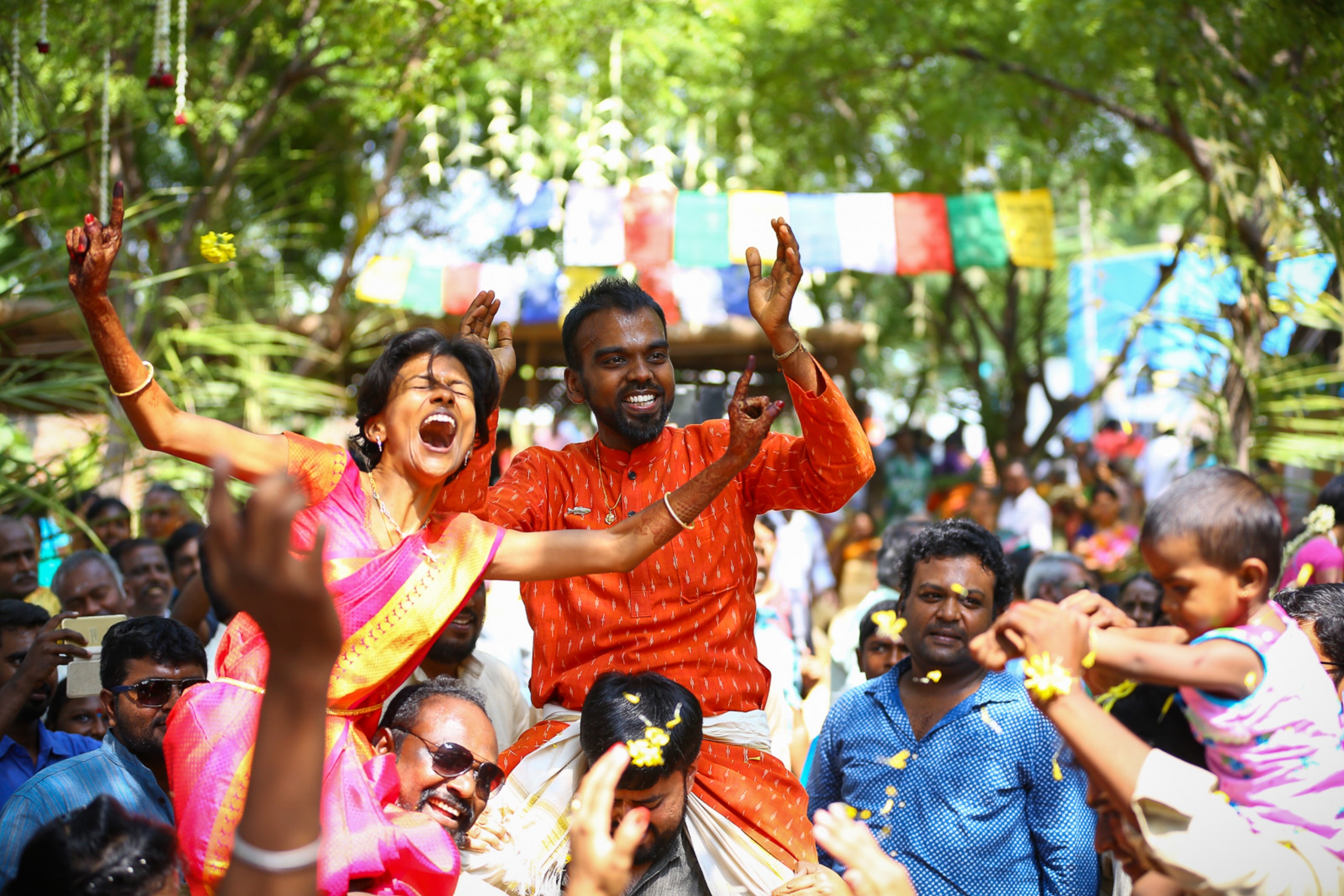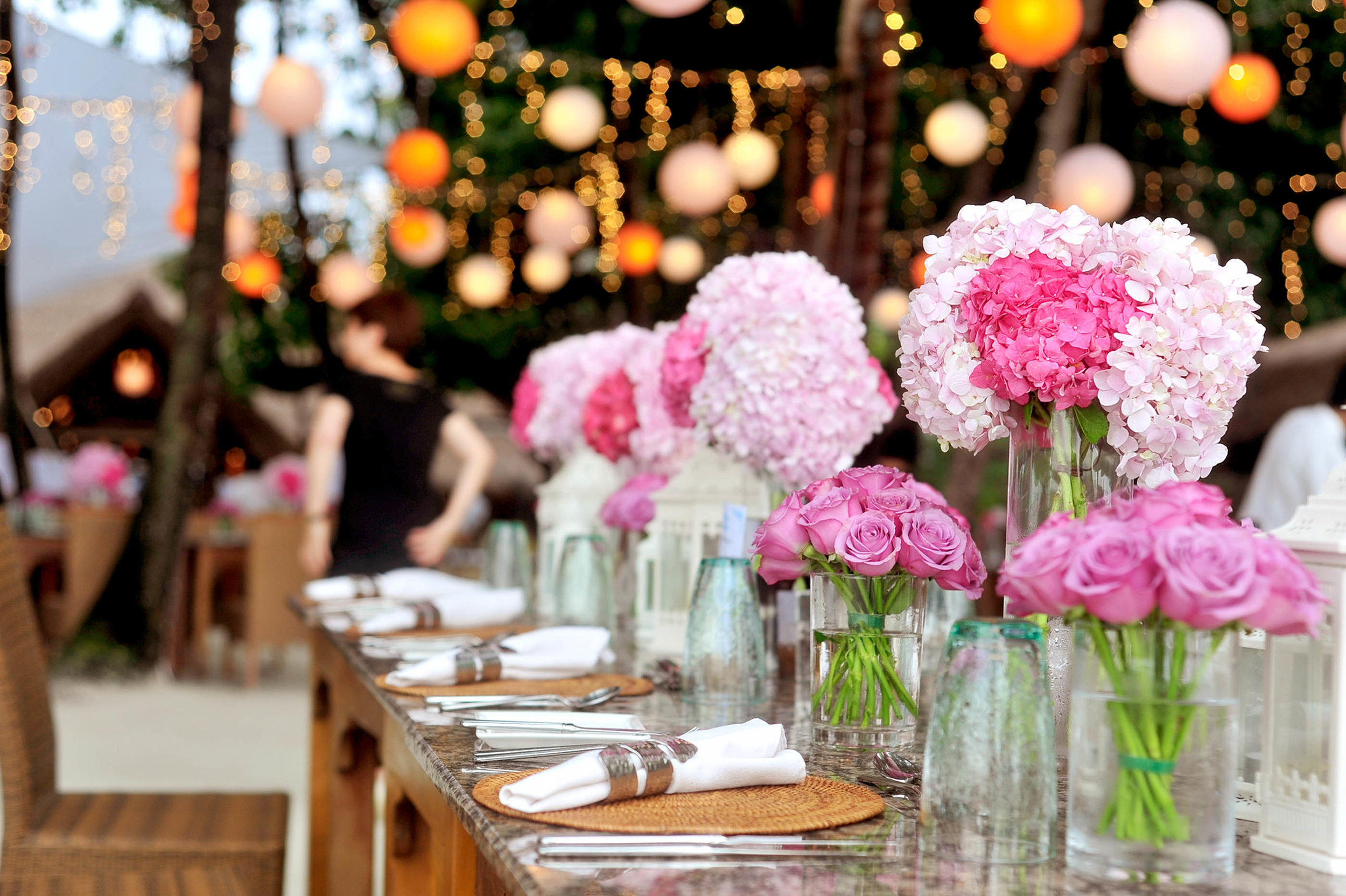How This Eco-Friendly Wedding Went Back In Time To Send Guests A Green Message

Dipitha Dilipan married her friend and partner, Stalin, in a grove of neem trees in November last year. On a stage framed by a curtain of creepers, the couple wed in an open air ceremony that the town talked about for days and will remember for years.
In the time of the big, fat Indian wedding, no aspect of which is spared the no-holds-barred treatment, this union from Virudhunagar in Tamil Nadu stands out.
Conversations of climate change entered Dipitha’s life as Bangalore’s trees gave way to concrete and the winters she grew up loving became shorter and warmer. Later, as a newly graduated architect, she was struck by the failure of both, her academic learning and the architectural practice, to address the looming resource constraints and environmental concerns of a fast growing city. Her quest for a better lifestyle led her to Auroville where she met sustainability practitioners from across the world who inspired and influenced her.
Being an avid motorcyclist took Stalin through parts of the country not many get to see. “I often ventured off-road into tiny hamlets and quiet forests,” he says, “and over the years, I couldn’t help noticing that our wild spaces are shrinking.” With gardening, he took his love of nature into his home and joined a growing community of urban gardeners, birdwatchers and outdoor enthusiasts.
The venue and stage
When the two decided to marry, naturally, a conventional ceremony was out of the question.
“We wanted our wedding to be an opportunity to share our values and love for an earth-friendly lifestyle with our families and friends,” says Stalin.
The event would take place in Thatha Thotam, a three-acre grove of trees belonging to Stalin’s family, where people could freely explore the garden and children had space to play. “We wanted to revive traditional practices in which recycling, reuse and zero-waste are immanent,” Dipitha tells me. Thus began the year long preparation for a wedding the likes of which Virudhunagar had never seen before.
The invitation and the messaging on responsible waste management
But, to put an eco-friendly wedding together meant stepping on many toes. Given the large number of elderly family members, Dipitha’s wish to send an e-invite and avoid paper was ruled out. She embarked on a month long exploration of alternatives. She toured the craft clusters of South India, visiting the palm leaf weavers of Manapad and the clay artisans of Manamadurai, sampling palm jaggery and millets, and buying handcrafted wooden toys from Channapatna. Meanwhile, Stalin’s mother busied herself with the preparation of medicinal kashaya from herbs growing in the patch while his father took charge of readying the garden for the event. With their efforts, the invitation slowly took shape. Guests received a beautifully woven palm basket with four cloth bags containing millets and a native variety of rice, small clay pots of palm jaggery and the herbal kashaya, and a traditional earthen lamp. At the bottom of the basket, Dipitha added a message about the importance of responsible waste management through segregation and composting. Each basket housed an invite designed by her on recycled paper.
In smaller towns, much like in cities, the pomp and extravagance on display at a wedding is an indication of the family’s social standing. As such, the couple's plans for a zero-waste wedding were met with considerable resistance by their extended family.
“Disposable cups and bottled water are unfortunately associated with hygiene and convenience and it took much convincing to do away with plastics and single-use items,” informs Dipitha.
Innovative middle ground was reached to settle the matter of serving drinking water. The water station had three containers for people to choose from - an earthen pot and a stainless steel bucket with boiled, herbal water and a plastic bubble top can with RO treated water, all accompanied by stainless steel tumblers. Explaining the absence of plastic cups was a hand-painted, bilingual sign detailing the contents of the water and a request to reuse the tumblers.
The drinking water station
Breakfast and lunch were vegetarian and included millets and traditional dishes served on banana leaves and arecanut leaf bowls. Small portions were served to minimise food waste and leftovers were composted a few yards from the dining area. Tea and coffee were supplemented by traditional beverages such as tender coconut water, panakam (a concoction of jaggery, dry ginger, lemon, and herbs), and paruthi paal (a traditional drink of cotton seeds, coconut, and jaggery that has all but disappeared from popular culture) served in clay pots. To combat the heat, fresh local fruits and freshly pressed sugarcane juice were served.
The decor, handcrafted from coconut fronds, palm leaves, coconut shells, seed pods, rope and gourds hung from the canopy of trees and blended in with the natural outdoor setting.
Natural decor
Older guests at Dipitha’s and Stalin’s wedding talk of a festive community gathering that had them reminiscing about their youth. Younger ones remember a day of running free and swinging in hammocks. Making the most of the al fresco space, the couple had activities such as pottery, slackline walking, origami and papercraft, seedball making, acroyoga, and a variety of traditional games including marbles, tops, and mancala to keep guests of all ages engaged. Dotting the garden were stalls selling native seeds and spreading awareness on waste segregation and composting. Guests could buy cloth bags or choose to walk around the grove, identify the herbs in it, learn their medicinal applications from a local Siddha expert and take saplings home.
Pot painting and a silambam performance at the wedding
The wedding ceremony was brief after which the main stage was freed up for performances by artistes from across Tamil Nadu. Students from Erode performed folk dances and silambam (a traditional martial art from Tamil Nadu) through which they communicated the importance to farmers and consumers of growing safe, chemical-free food. A band from Bangalore, known for its earth-friendly, percussion-heavy rhythm had guests dancing into the night.
“Our wedding ceremony began with our grandparents introducing the event to the gathering. This was followed by Stalin and I talking about what living sustainably means to us and why we chose this unconventional way of getting married,” Dipitha mentions. Much to the chagrin of her family, Dipitha went make-up free and by way of jewellery wore only an heirloom necklace belonging to her grandmother. She dressed in a handwoven silk sari while Stalin wore a handloom cotton kurta and dhoti. The couple exchanged wooden rings and together planted a sapling to symbolise their union and the start of a new life together.
“We broke with tradition on many occasions during the wedding,” recalls Dipitha. “We married in Stalin’s family orchard when convention dictates the wedding must take place at the bride’s house. I also refused to wear traditional bridal finery or observe any rituals.” What started off as a daunting task, with their families fearing social criticism, ended up drawing wholehearted participation from friends and family, community members, and even the local panchayat chief who supplied the furniture for the party.
“Once people understood where we were coming from, suggestions and help came from unexpected quarters. What was meant to be a simple ceremony took on the makings of a village fair. People pitched in with ideas for how to make it more eco-friendly and others volunteered to lead different activities.”
As favours, guests took home small cloth bags containing a pocket sketchbook, colour pencils and postcards to write back to the couple with questions or thoughts about the wedding. They have received several responses since from people touched by different aspects of the ceremony. Dipitha adds, “At first, people, including our grandparents thought we were being arrogant and rebellious, but then they learned of our intentions and turned into a source of support." Says Stalin, “We believe that we have a responsibility to leave the earth better off than we found it and that there is peace and joy in doing things sustainably. But, we cannot force our views upon others. Our wedding was a way of honouring our ideals and sending a message that it is possible to celebrate in an earth-friendly way and have a wonderful time doing it.”
Wish to have a wedding like Dipitha and Stalin's? Below are details of the service providers they used:
- Cloth bag and plastic awareness stall: Theyellowbag, Madurai - 9884952604
- Native seeds: Iyalvaagai, Erode - 9942118080
- Decor: Kavin Gallery (Ananda Perumal) - 9443444478
- Silambam and native folk dance performances by Kalaithaai Kattalai, Erode: 9965203333
- Musical performances by TerraTaala, Bangalore
- Native medicinal herb expert: Vignesh 9486619528.
Maya is a social researcher by training. Her writing has appeared in Scroll, YourStory and The Alternative. She is the Founder of Eartha and tweets @Maya_Kilpadi.











